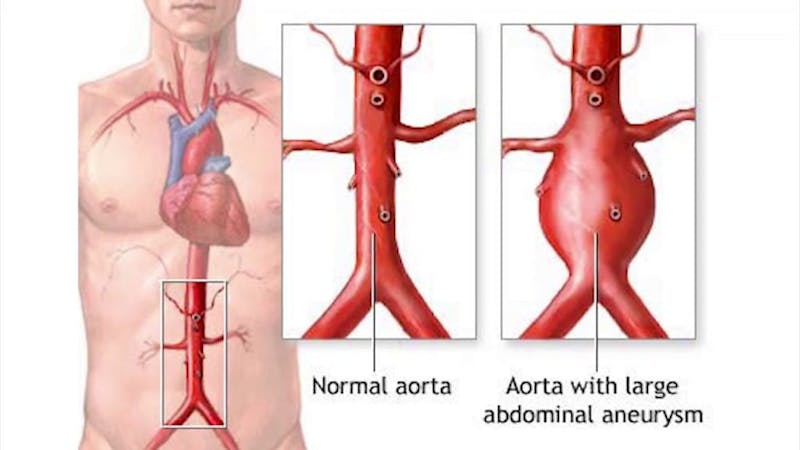
The aorta is the body’s largest artery. This major blood vessel, with nearly the same diameter as a garden hose, runs all the way from the heart through the chest cavity and abdomen. The abdominal aorta (the portion of the artery running through the abdomen) carries oxygenated blood to the lower half of the body.
An aortic aneurysm occurs when a bulge forms in the wall of the blood vessel, like a balloon. The condition can occur in any part of the aorta but most commonly occurs in the abdominal aorta. If left untreated, abdominal aortic aneurysms can burst or rupture, causing life-threatening internal bleeding. They are the tenth leading cause of death in men over 55 in the United States, accounting for approximately 20,000 deaths annually.
Fortunately, an abdominal aortic aneurysm can be effectively monitored and treated, especially when diagnosed early.
Abdominal Aortic Aneurysm Symptoms and Risk Factors
Most people are unaware they have an abdominal aortic aneurysm because in most cases, it is asymptomatic. However, as an aneurysm grows, the most common symptoms include:
- Abdominal pain
- Back pain
- Abnormal pulsations in the abdomen, similar to a heartbeat
If the pain in the abdomen and/or lower back is sudden and severe, it may be a sign the aneurysm is about to burst. A ruptured aneurysm is life threatening and requires immediate medical attention.
Although the exact cause of abdominal aortic aneurysms is unknown, there are certain factors that increase a person’s risk:
- Smoking
- A first-degree family history of abdominal aortic aneurysms requiring surgical repair
- High cholesterol
- Hypertension (high blood pressure)
- Coronary artery disease
- Chronic obstructive pulmonary disease (COPD)
- History of cardiac bypass
- Arteriosclerosis
How is an Abdominal Aortic Aneurysm Treated?
Depending on the size of the abdominal aortic aneurysm and how quickly it is growing, treatment may vary from medical management and monitoring to emergency surgery.
After abdominal aortic aneurysm is diagnosed, Surgical Associates’ vascular team will monitor it closely so that a surgery can be planned if necessary. There are two types of surgery used to repair an abdominal aortic aneurysm: open surgical repair and endovascular aneurysm repair (a less invasive procedure). Typically, surgery is only recommended when the abdominal aortic aneurysm is larger than 5 cm (2 inches) in diameter.
How to Manage your Risk Factors for an Abdominal Aortic Aneurysm
The best way to prevent an abdominal aortic aneurysm is to maintain a heart-healthy lifestyle. You can lower your risk for developing the condition by following these guidelines:
- Don’t smoke
- Eat a healthy, balanced diet
- Maintain a healthy weight
- Exercise regularly
- Lower your blood pressure if it is too high
Set Up an Abdominal Aortic Aneurysm Screening at Surgical Associates
An ultrasound examination is the most effective way to diagnose an abdominal aortic aneurysm. The non-invasive, pain-free screening lasts about 15 minutes.
Six to eight hours before the examination, patients are required to take nothing by mouth (NPO), including no smoking and no gum. After the ultrasound, a report will be sent to the patient’s primary provider.
Why Choose Surgical Associates for the Management or Treatment of an Abdominal Aortic Aneurysm?
Surgical Associate’s team of board-certified vascular surgeons is highly-trained in the complex practice of correcting vascular problems. Our surgeons work closely with the Vascular Laboratory (located in our clinic) as well as the catheterization laboratory at the Aspirus Heart & Vascular Institute.
We take pride in our comprehensive approach to vascular care at Surgical Associates. Our clinic has trained nurse practitioners focused on vascular disease and an accredited vascular ultrasound department providing services within our clinic setting. Surgical Associates vascular surgeons are fellowship-trained and dedicated to quality outcomes. Patients at Surgical Associates report a client satisfaction score of 4.98/5.
Call 715-847-2022 to set up an abdominal aortic aneurysm screening today or contact Surgical Associates for more information.


